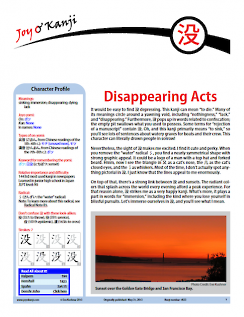没
sinking; immersion; disappearing; dying; lack
Kanji 1823
Thank you for visiting this Character Home Page. Below you'll find a synopsis of the essay. If you wish to read the full text, the PDF of the essay is available for purchase to the right.
As the abundant sample sentences show, 没 enables you to talk about passing out drunk, dropping a phone in the toilet, having things confiscated or rejected, lacking a personality, and going down with a sinking ship. Nevertheless, 没 strikes me as a happy kanji! It's strongly associated with sunsets, and it appears in words for "immersion" (e.g., losing oneself in blissful pursuits).
Revision history:
June 29, 2023:
p. 8:
- Greatly expanded the definitions of 埋没, now using those in Breen.
- Then resequenced two sample sentences to match the new order of meanings.
- Changed the definition of 気がない to “having no intention of doing.”
June 16, 2021:
- p. 5: In the 3rd sample sentence, I redefined 貨物船 as “cargo ship” and changed the sentence translation accordingly.
- p. 14: Deleted Sidebar 4 on 没交渉 because it was based on an etymology of 渉 that Henshall included in his earlier edition but excluded from his later one. I renumbered the next two sidebars.
- p. 14: Added a link to the Kanshudo games.
July 31, 2019:
- p. 2: Completely rewrote the Henshall etymology to match his updated edition. Also updated the Sears link.
- p. 2: Revised the sentence about Fuji at sunset to make it more natural.
- pp. 3–4: Severely abridged a discussion of Richard Linklater film titles, as most were irrelevant to the discussion!
- p. 12: Changed the yomi of 皆 from みんな to みな.
- p. 14: Added a link back to this page so you can more easily access the game below.
June 22, 2013: p. 6 sidebar: Changed the yomi of 実に from まことに to じつに. Although まことに is correct, it's a non-Joyo yomi, so じつに is better.
May 31, 2013: Originally published.



Comments